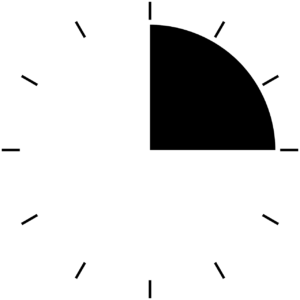Your motivation is key
 One of the most common questions my students ask me, and rightly so, is how long it takes to learn French. It is difficult to say as several factors come in to play. Generally, it depends on factors like individual learning pace, previous grammar knowledge (if you understand grammar in your own mother tongue, then you can make comparisons, understanding French grammar becomes easier). Usually, students who have already learnt a foreign language find it easier to learn French, just because they’re used to switching languages they can make connections. Of course, if you can speak a Latin-based language, you’ll probably learn faster as the vocabulary and grammar are similar.
One of the most common questions my students ask me, and rightly so, is how long it takes to learn French. It is difficult to say as several factors come in to play. Generally, it depends on factors like individual learning pace, previous grammar knowledge (if you understand grammar in your own mother tongue, then you can make comparisons, understanding French grammar becomes easier). Usually, students who have already learnt a foreign language find it easier to learn French, just because they’re used to switching languages they can make connections. Of course, if you can speak a Latin-based language, you’ll probably learn faster as the vocabulary and grammar are similar.
But in my opinion, what will really define your progress’s speed is your degree of motivation. If you are a complete beginner but very motivated, then in a few months, your level in French should be enough to get by in daily life situations. On the contrary, a student who only attends the lessons but doesn’t do any homework will need twice more time to reach the same level. Of course, having several French lessons means faster progress, but it is not simply about the number of lessons you will get. Revising regularly what you have studied is crucial. It is more efficient to revise in short sessions and often rather than do longer sessions more seldom.
How to make faster progress:
- Be proactive during your lessons. Try, speak, ask questions.

- Accept you will make mistakes; it is the only way to learn. You take classes to make mistakes with me and learn from them so you won’t make the same mistakes.
- Do the homework, at least 1/ 1.5 hours per lesson and use the Quizlet flashcards I prepare for you.
- Practise French between two lessons: by doing an activity for 15 minutes, not more, every day, such as listening to French radio or audio-books, watching French films or French TV, reading French newspapers or magazines. It is much more efficient to work your French 15 minutes per day, at least 5 days a week, rather than a whole day once every 2 weeks.
15 minutes, 5 days a week: stick to it
 Learning a language, like anything else, takes time, of course. We are all busy, so there will always be something else to do. Yes, sometimes we are tired, and it is so tempting to collapse on the sofa rather than do the French homework ; ). There will always be a good excuse to postpone it or not to do it, That’s why aim to practise your French for 15 minutes per day, not more. Because the truth is, if you really want to learn French, then you’ll find ways to find the time to do your homework and practice daily for 15 minutes between two lessons. And when you need a little push, remember this: the more hours you spend practising French between two lessons, the faster you will progress and the cheaper it will be for you!
Learning a language, like anything else, takes time, of course. We are all busy, so there will always be something else to do. Yes, sometimes we are tired, and it is so tempting to collapse on the sofa rather than do the French homework ; ). There will always be a good excuse to postpone it or not to do it, That’s why aim to practise your French for 15 minutes per day, not more. Because the truth is, if you really want to learn French, then you’ll find ways to find the time to do your homework and practice daily for 15 minutes between two lessons. And when you need a little push, remember this: the more hours you spend practising French between two lessons, the faster you will progress and the cheaper it will be for you!
Here is a rough guideline as to how many hours it usually takes to reach each language level. This is a very rough estimate and can vary considerably between individuals, but it may at least give an idea of what to expect:
Level |
Description |
A1 |
Can understand and use familiar everyday expressions and very basic phrases aimed at the satisfaction of needs of a concrete type. Can introduce him/herself and others and can ask and answer questions about personal details such as where he/she lives, people he/she knows and things he/she has. Can interact in a simple way provided the other person talks slowly and clearly and is prepared to help. |
A2 |
Can understand sentences and frequently used expressions related to areas of most immediate relevance (e.g. very basic personal and family information, shopping, local geography, employment). Can communicate in simple and routine tasks requiring a simple and direct exchange of information on familiar and routine matters. Can describe in simple terms aspects of his/her background, immediate environment and matters in areas of immediate need. |
B1 |
Can understand the main points of clear standard input on familiar matters regularly encountered in work, school, leisure, etc. Can deal with most situations likely to arise whilst travelling in an area where the language is spoken. Can produce simple connected text on topics which are familiar or of personal interest. Can describe experiences and events, dreams, hopes & ambitions and briefly give reasons and explanations for opinions and plans. |
B2 |
Can understand the main ideas of complex text on both concrete and abstract topics, including technical discussions in his/her field of specialisation. Can interact with a degree of fluency and spontaneity that makes regular interaction with native speakers quite possible without strain for either party. Can produce clear, detailed text on a wide range of subjects and explain a viewpoint on a topical issue giving the advantages and disadvantages of various options. |
C1 |
Can understand a wide range of demanding, longer texts, and recognise implicit meaning. Can express him/herself fluently and spontaneously without much obvious searching for expressions. Can use language flexibly and effectively for social, academic and professional purposes. Can produce clear, well-structured, detailed text on complex subjects, showing controlled use of organisational patterns, connectors and cohesive devices. |
C2 |
Can understand with ease virtually everything heard or read. Can summarise information from different spoken and written sources, reconstructing arguments and accounts in a coherent presentation. Can express him/herself spontaneously, very fluently and precisely, differentiating finer shades of meaning even in the most complex situations. |
I hope this helps,
A bientôt sur Skype ou Zoom,
Stéphanie
